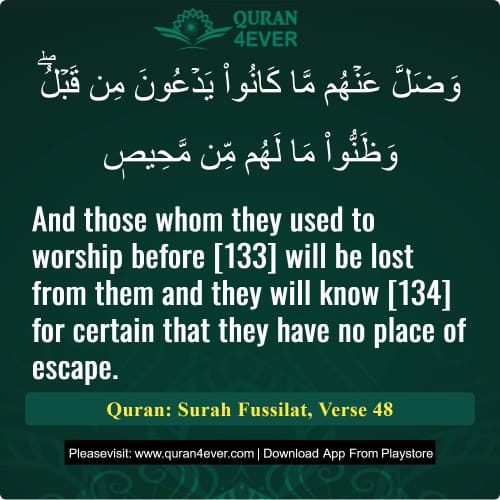
Transliteration:( Wa dalla 'anhum maa kaanoo yad'oona min qablu wa zannoo maa lahum mim mahees )
"And those whom they used to worship before [133] will be lost from them and they will know [134] for certain that they have no place of escape."
The demonstrative pronoun "those" refers to the idols made of wood and stone that the polytheists used to worship. On the Day of Judgement, these deities will be of no benefit, completely absent or vanished, leaving their worshippers in utter regret and confusion. This verse does not refer to the Prophets, because attributing divinity to Prophets was never claimed by the Prophets themselves—rather, it was a fabrication by their followers.
The word "Zun" in this verse signifies certainty and not mere conjecture or assumption. Although “Zun” often implies speculation in general usage, in the Qur'anic context, it can also mean surety, depending on context. This principle is important for interpreting many similar verses in the Qur'an where "Zun" reflects conviction, especially in matters concerning Judgement Day or belief in the unseen.
This verse portrays the scene of ultimate despair for the polytheists, who will realize with certainty that there is no refuge, escape, or support—their so-called gods will fail them utterly.
The tafsir of Surah Fussilat verse 48 by Ibn Kathir is unavailable here.
Please refer to Surah Fussilat ayat 46 which provides the complete commentary from verse 46 through 48.
(41:48) Then all those deities whom they once used to call upon shall vanish[64] and they will come to know for sure that there is no escape for them.
64. That is, in their utter hopelessness they will look around to see if they could find any one of those whom they used to serve and worship in the world, who could come to their rescue and save them from God’s torment, or at least have their punishment reduced, but they will find no helper on any side.

For a faster and smoother experience,
install our mobile app now.
Related Ayat(Verses)/Topics